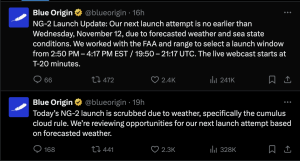Key Takeaways
- Blue Origin scrubbed its New Glenn rocket launch carrying NASA’s Mars ESCAPADE probes due to weather.
- The delay occurred just before new FAA restrictions on commercial daytime launches took effect.
- This marks NASA’s first Mars mission in five years, designed to study atmospheric loss on the Red Planet.
Jeff Bezos’ Blue Origin has postponed the launch of its New Glenn rocket, which was set to carry NASA’s twin Mars ESCAPADE orbiters. Unfavorable weather conditions at Cape Canaveral, Florida, forced the scrub during an 88-minute launch window.
The delay comes just one day before new Federal Aviation Administration (FAA) restrictions on commercial spaceflights were scheduled to begin. Blue Origin is now working with the FAA to secure an exception, as the agency has announced an indefinite halt to all commercial daytime launches starting November 10.
Blue Origin’s Official Statement
The company confirmed the delay in a social media post, stating:
Today’s NG-2 launch is scrubbed due to weather, specifically the cumulus cloud rule. We’re reviewing opportunities for our next launch attempt based on forecasted weather.
Blue Origin later provided an update on potential launch windows through another social media post.
About NASA’s ESCAPADE Mission
NASA’s ESCAPADE mission (Escape and Plasma Acceleration and Dynamics Explorers) represents the agency’s first Mars mission in five years, having been delayed since October 2024. The twin orbiters, built by Rocket Lab, will study how solar wind and space weather contributed to Mars losing much of its atmosphere, transforming it into the dry, barren planet we see today.
Developed for under $80 million and led by University of California, Berkeley scientists, the mission includes a ViaSat communications experiment aboard the New Glenn’s second stage as part of NASA’s Communications Services Project.
This launch will be the second flight of Blue Origin’s New Glenn rocket, following its inaugural mission in January. The company aims to recover the first-stage booster by landing it on an Atlantic Ocean barge for future reuse, after a previous recovery attempt failed.
Blue Origin plans to position New Glenn as its primary rocket for commercial satellite missions, heavy payload launches, and future crewed and uncrewed lunar missions using Blue Moon landers .





